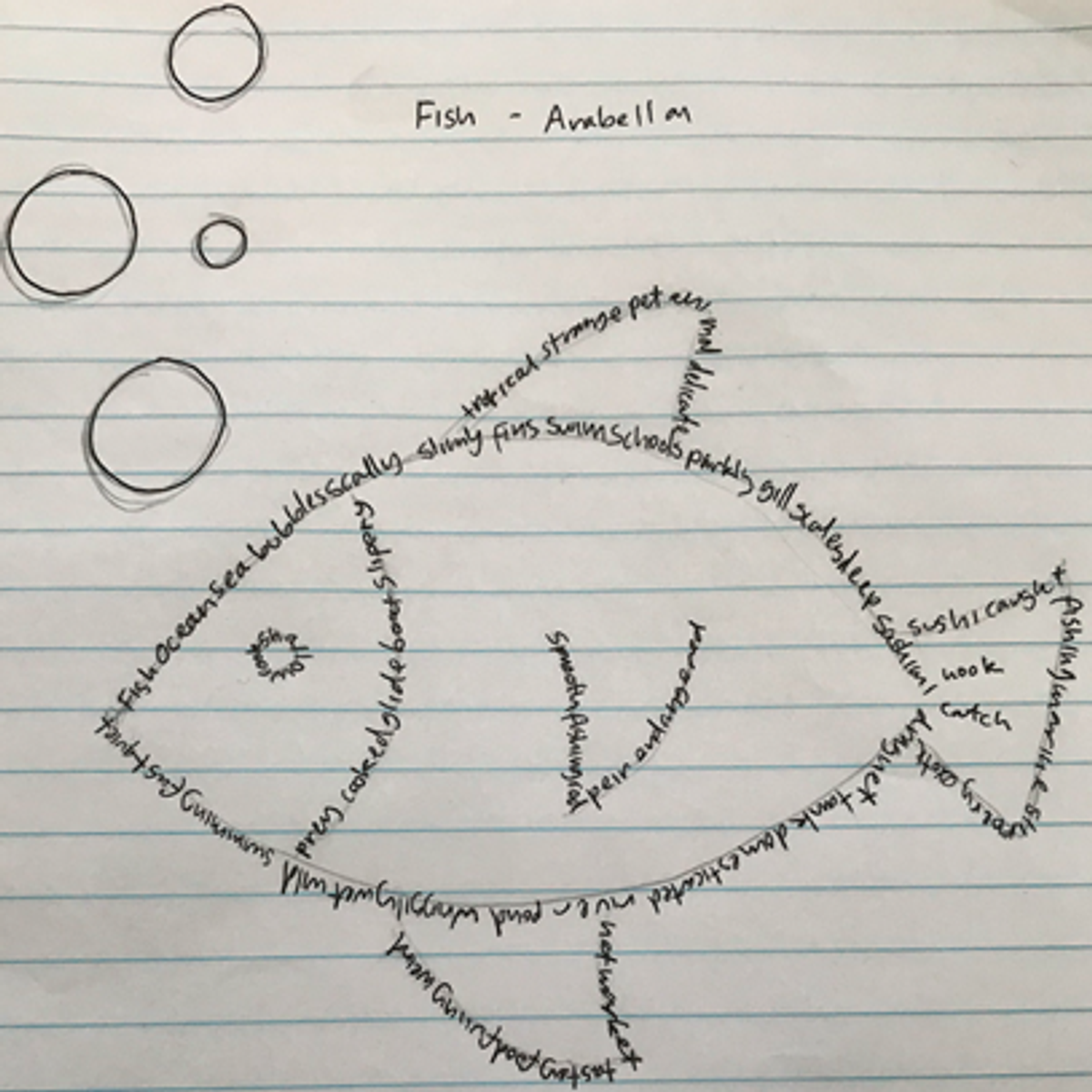MYP: Connecting to Language & Literature
Photo: Calligram poem by Hamish, Year 7

MYP: Connecting to Language & Literature
Photo: Calligram poem by Hamish, Year 7
YEAR 7
Statement of Inquiry: Poetic form and structure are vehicles to express ideas and feelings creatively.
Students in Year 7 have been inquiring into the concepts of creativity, structure and style to guide their learning this term. They have examined various forms of poetry, including limerick and narrative poems to acquire an understanding of the different structures, styles and language devices employed. The Global Context, Personal and Cultural Expression, has guided learning experiences to embrace their creativity and artistry. Students have also inquired in textual analysis and figurative language to create their own poems.
Later in the term, students will apply their knowledge of poetry to write and perform their own Slam Poem. Here, students will refine their oral language and presentation skills to deliver a poem that is both rhythmic and dynamic but, most importantly, expresses an issue or experience significant to them. It will be an opportunity for students to develop confidence in speaking in front of an audience and to experiment with word choices and sound devices. Furthermore, students will be supported to create a Slam Poem with the objective of initiating or provoking positive change in their world.
The Sounds Of Nature
Swish Swoosh Goes The Leaves
Pitter Patter Goes The Rain
Gurgle Goes The Stream
The Presence
You Feel A Presence
All Expansive And Knowing
Is The Odd Presence
Sounds Of The Night
Croak Croak Goes The Frog
Whoo Whoo Goes The Owl At Night
Squeak Goes The Possum
(all three Haiku poems written by Ethan)


Velvet Claw
Starkly passes through lifeless clouds
A tail of great light
His scales are akin to silver
Aflame with woodland sprites
His claws are velvet laced
From the airplanes he has chased
No air will go to waste it travels along his face
Dark spans of night sky are breathed in and erased
As a dragon changes pace
A blue flash of cool air vanishes without a trace
A single speck on the quilt of space
A journey home to God’s great place
Tavilvi Wacle
(Narrative poem by Paige)
YEAR 8
Statement of Inquiry: Setting and characters in dystopian fiction communicate ideas about authority, security and freedom.
Students have been delving into the concepts of communication, character and setting through our statement of inquiry. Throughout Term 3 students read Lois Lowry’s The Giver, which presents a futuristic world where personal freedom and choice is sacrificed to provide greater security for society. Written in 1993, The Giver follows the journey of 12 year old Jonas who lives in a society which at first appears to be utopian. However, as he begins to ‘see beyond’ and acquire more memories and knowledge from the past, the limitations of his community become visible and his society begins to more closely resemble dystopia.
Whilst studying the text, students uncovered some powerful underlying themes including censorship of information, the individual vs. society, bodily autonomy, social conditioning, rituals and eugenics.The novel uncovered the sometimes bizarre and often harmful lengths that oligarchical societies go to in order to maintain a predictable and safe society.
The unit has crept into Term 4 and students are writing an essay that explores the juxtaposition of choice and security in dystopian societies.
YEAR 9
Statement of Inquiry:
Students understand that texts are socially, politically and historically constructed and determine the extent to which they explore universal themes.
Power and Politics in Elizabethan Tragedy
Year 9 Language and Literature students are currently completing their analytical essays for the Power and Politics in Elizabethan Tragedy. They have been given the following questions to choose from as well as being giving the opportunity to write their question:
How is gender socially and historically constructed throughout Macbeth?
OR
How does the metaphor of England as a garden reveal possible political connotations of Macbeth and how this might reflect emerging English social values at the time?
YEAR 10
Statement of Inquiry: Authors create individual voices as an expression of identity, reality and culture through language systems.
Students will delve into the short story novel Foreign Soil - ethnicity, colour, race and racism are at the heart of the issues of social and political justice that are central to such a focus. In their study of the text, students will explore the short story narrative form (narrative shape/structure), narrative voice, diverse socio/cultural settings/context, characterisation, tone, language and style. These stories are also concerned with gender fluidity, social class, personal experiences of women and children, and the effect of conflict on people’s lives.
Other questions within the unit include: What other language systems have been developed as a lived experience of cultural displacement? and How is language used as a medium for personal and social constructions of reality?
Emily Nancarrow, Matt Barker,
Veronica Fong, Bec Bettiol,
Rose Fearon, Anthony Cavagna
teachers of MYP Language & Literature
emily.nancarrow@preshil.vic.edu.au
matthew.barker@preshil.vic.edu.au
veronica.fong@preshil.vic.edu.au
bec.bettiol@preshil.vic.edu.au